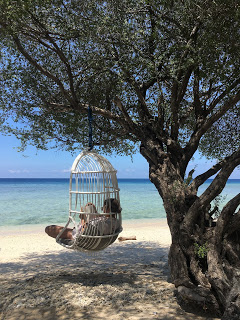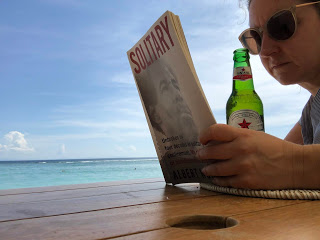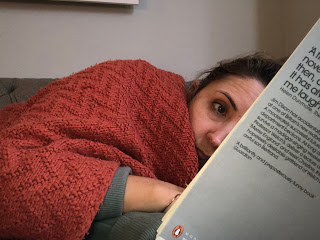
I started seeing people wearing face masks in the airport and decided that I hated them. What bugged me I realized, was their flagrant regard for their own lives. It seemed not just overcautious but downright conceited. I mean, why should they live?

I started seeing people wearing face masks in the airport and decided that I hated them. What bugged me I realized, was their flagrant regard for their own lives. It seemed not just overcautious but downright conceited. I mean, why should they live?

Apparently once you reach your late thirties you lose your sense of humour. Or at least that is what I get from this book, which targets my demographic with a surgical precision that is almost embarrassing.
Every so often one of those people will look up towards the house. They know what the person is thinking – how do you get to live in a house like that?
We fought for you. We fought for you to be extraordinary. We changed the world for you and what have you done with it?
Bitter red leaves mixed in amongst the green, walnuts and goat’s cheese crumbled on the top. There is olive oil in a separate bowl, with a pool of balsamic at the bottom. Good, chewy bread with salty butter.
I mean, did I have a hard time re-conceptualizing myself as a not-genius? Yeah, that took some processing.

The horrors of the prison in 1965 cannot be exaggerated.
It was also the day sexual predators lined up and looked for their next victims. Sexual slavery was the culture at Angola. . . . If you were raped at Angola, or what was called ‘turned out,’ your life in prison was virtually over. You became a ‘gal-boy,’ . . . you’d be sold, pimped, used, and abused by your rapist and even some gaurds. Your only way out was to kill yourself or kill your rapist.
26 of us went down the walk that day. T.Ratty and I were the only two who didn’t get turned out.
I didn’t say much. My communication with Herman was mostly silent. I didn’t know how much time he had left. I silently told him how much I loved him, and that when we didn’t have his back anymore, the ancestors would.
The state may have stolen my life, but my spirit will continue to struggle along with Albert and the many comrades who have joined us along the way here in the belly of the beast.In 1970 I took an oath to dedicate my life as a servant of the people, and although I ‘m down on my back, I remain at your service.
Some people turn to drink to get them through their divorce. Deborah Levy turns to notable literary feminists. The result is a sad and thoughtful memoir about starting again at fifty. It’s also a little annoying. Levy (or her editor) aren’t shy, so there are lots of disconnected snippets of ordinary life, including a nice long list of what she can see in her study. This is in my experience a major red flag in terms of getting carried away with how literary we are. There is also some pretty appallingly bougey North London bits, as when her friend lends her a study. (Who has this kind of space? I’ll tell you, people with inherited wealth in N. London). Also, she seems to find riding with Uber drivers unnerving, because they use satnav:
It made them rootless, ahistorical, unable to trust their memory or senses, to measure the distance between one place and another. The River Thames, referred to by Londoners as the river, was of no geographical significance to the driver. It . . .was just one of many abstract rivers flowing through the abstract cities of the world.
That’s just called being an IMMIGRANT. I don’t know why she makes it sound like being rootless and ahistorical is a bad thing. For some of us, that’s just life.
Anyway, I’m not sure why I got carried away bashing on this book, because in fact I liked it. She has lots of little nuggets of wisdom, of which a few samples, below:
The writing life is mostly about stamina
It was obvious that femininity, as written by men and performed by women, was the exhausted phantom that still haunted the early twenty-first century.
It is so hard to claim our desires and so much more relaxing to mock them
This last, I read out loud to a man, to say how true it was, and he looked at me blankly. I don’t mock my desires, he said. One thing I think is true: men are often more successful than women simply because they take themselves more seriously
Lastly, I liked her perspective on how sadness can be a choice. She said hers was “. . . was starting to become a habit, in the way that Beckett described sorrow becoming ‘a thing you can keep adding to all your life … like a stamp or an egg collection.'” She looked at it specifically through the lens of the kinds of narratives we tell ourselves. Here specifically on divorce:
When a woman has to find a new way of living and breaks from the societal story that has erased her her name, she is expected to be viciously self-hating, crazed with suffering, tearful with remorse. These are the jewels reserved for her in the patriarchy’s crown, always there for the taking. There are plenty of tears, but it is better to walk through the black and bluish darkness than reach for those worthless jewels.
It’s a long time since I heard anyone use the word patriarchy without an edge of mockery. Patriarchy aside, I like the idea that you can pick or choose what story you are in

The notion that women like this were never on view except as the property of men like Bertrand was so familiar to him that it had long since ceased to appear as an injustice
Fury flared up in his mind like forgotten toast under a grill.
. . . potted and tubbed palms of an almost macabre luxuriance.
Dixon thought he really would have to run downstairs and knife the drivers of both vehicles; what next? what next? What actually would be next: a masked holdup, a smash, floods, a burst tyre, an electric storm with falling trees and meteorites, a diversion, a low-level attack by Communist aircraft, sheep, the driver stung by a hornet? He’d choose the last of these, if consulted. Hawking its gears, the bus crept on, while every few yards troupes of old men waited to make their quivering way aboard.

“I am making some curtains for Molly’s sitting room,” and held up a pair of bloomers, right in front of Ralph.
He had not, in any conscious way, really connected his knowledge with people, as now he did, to his shame and sorrow, wondering with especial revulsion, about the Follansbees. He found himself compelled to study the faces of the men at the diner table and to look with stunned amazement at Mrs Brotherman
. . she reached for her diary and her pencil and to the list of unforgivable she added her own name. She burst into tears and cried until she was hungry, and all the time she cried she watched herself in the mirror, getting uglier and uglier until she looked like an Airedale.